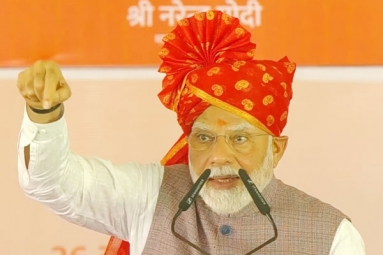
(Image source from: Twitter.com/narendramodi)
The rising prevalence of obesity has become a significant health issue, with concerning statistics reflecting a steep increase in cases over time. Recently, Prime Minister Narendra Modi highlighted this challenge, advocating for a 10% reduction in edible oil consumption as a straightforward yet impactful measure for promoting better health.
During his Mann Ki Baat address on February 23, he remarked, “At the inauguration of the National Games in Dehradun, I introduced a crucial topic that has sparked a national conversation – the matter of ‘obesity’. To establish a fit and healthy nation, we must confront the obesity issue.” He underscored that this issue extends beyond individual responsibility; it is a collective national challenge that necessitates a united response.
To propel this initiative, on February 24, PM Modi selected ten noteworthy individuals, including business leaders, athletes, politicians, and artists, urging them to help raise awareness and motivate others to make similar dietary adjustments. In a post on X, he stated, “As mentioned in yesterday’s MannKiBaat, I nominate the following people to aid in combating obesity and raise awareness about decreasing edible oil usage in meals. I also invite them to nominate ten others so that our movement expands!” The selected nominees encompass industry leaders like Anand Mahindra and Nandan Nilekani, athletes including Manu Bhaker and Mirabai Chanu, Chief Minister Omar Abdullah, MP Mohanlal and Sudha Murthy, BJP leader Dinesh Lal Yadav, actor R Madhavan, and singer Shreya Ghosal.
As the conversation gains traction, it prompts critical inquiries into how our eating patterns influence obesity and what broader measures can be implemented to address this escalating dilemma. Oils are calorie-dense, meaning that even small amounts can contribute significantly to total caloric intake. When paired with other elements like a lack of physical activity, high consumption of processed foods, and an abundance of refined carbohydrates, the likelihood of obesity rises considerably. While higher oil consumption can elevate overall energy intake, especially if not balanced with other dietary elements, its ramifications are frequently eclipsed by factors like the excessive consumption of ultra-processed foods and refined carbohydrates, which are more closely associated with obesity. Additionally, lifestyle choices such as physical activity levels and overall dietary balance play crucial roles in determining obesity risk.
As mentioned in yesterday’s #MannKiBaat, I would like to nominate the following people to help strengthen the fight against obesity and spread awareness on reducing edible oil consumption in food. I also request them to nominate 10 people each so that our movement gets bigger!… pic.twitter.com/bpzmgnXsp4
— Narendra Modi (@narendramodi) February 24, 2025
For cooking in India, it is advisable to choose cost-effective yet healthy oils like sunflower, groundnut, or mustard oil. These options provide vital fatty acids and can be used in moderation to enhance both flavor and nutritional content. Practicing portion control by accurately measuring oil and limiting oil-rich dressings and sauces can help curb excess calorie consumption. Instead of depending solely on oils for healthy fats, adding avocados, nuts, and seeds to dishes ensures essential nutrients without unnecessary caloric intake.
Moreover, being vigilant about examining food labels and keeping track of the fat levels in packaged items can aid individuals in making well-informed decisions and in decreasing unnoticed sources of unhealthy fats within their diets. To address the increasing issue of childhood obesity, it is important for parents to advocate for a nutritious diet abundant in fruits, vegetables, whole grains, and lean protein, while also minimizing the consumption of saturated fats and sugars. It is essential to encourage consistent physical activities, aiming for at least 60 minutes each day, as well as limiting screen time to under two hours.
In addition to dietary considerations, modifications to one’s lifestyle are similarly vital. Promoting regular exercise, cutting down on screen exposure, and encouraging outdoor activities can play a significant role in preventing weight gain and enhancing overall health. Additionally, ensuring that children receive adequate sleep through established bedtime routines further contributes to a healthy metabolism and effective weight management.





















